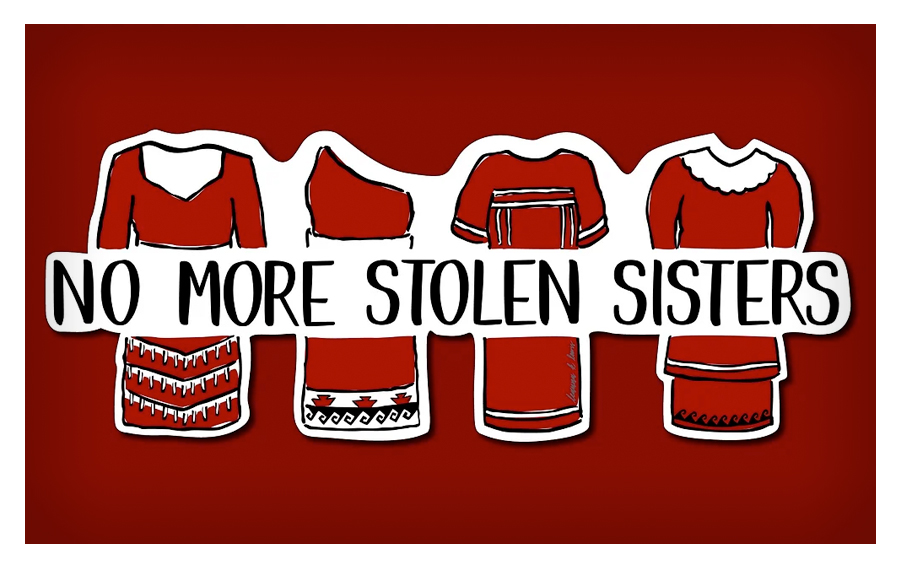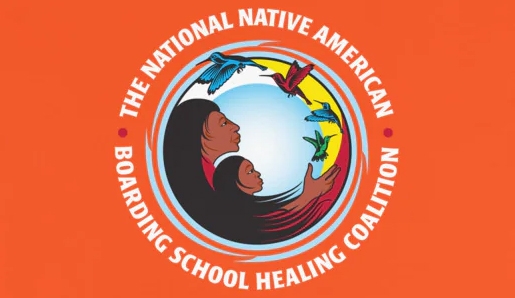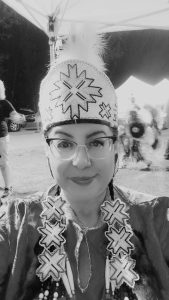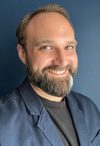The following is cross-posted from Living Lutheran. The original post can be found here.
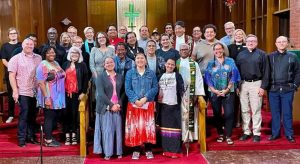
The inaugural cohort of Pacific Lutheran Theological Seminary’s (PLTS) Theological Education for Indigenous Leaders (TEIL) launched on Oct. 9 with an opening ceremony and shared celebration attended by leaders from across the ELCA. Photos: Courtesy of Pacific Lutheran Theological Seminary
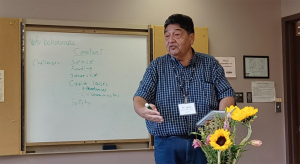
Larry Thiele, a pastor in the Eastern North Dakota Synod, teaches a TEIL course as one of the program’s wisdom keepers.
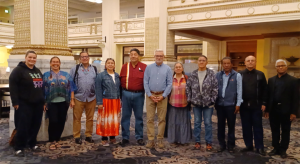
Some of the Indigenous leaders and wisdom keepers of the TEIL program with Moses Paul Peter Penumaka, director of Theological Education for Emerging Ministries (far right); PLTS Rector Raymond Pickett (center); and Francisco Javier Goitia Padilla, director of theological formation for seminaries and schools of the ELCA (second from right).
Centuries after colonial models of education were first forced on Indigenous people in North America, their effects are still keenly felt. Western theological education has remained the default methodology within the church, including the ELCA. This fall, Native leaders from across the ELCA, in partnership with leaders from Pacific Lutheran Theological Seminary (PLTS) of California Lutheran University in Berkeley, are seeking to change that with the launch of the Theological Education for Indigenous Leaders (TEIL) program.
“The TEIL program is a historic and first-of-its-kind opportunity for Indigenous leaders and for our church,” said Vance Blackfox, ELCA director of Indigenous Ministries and Tribal Relations. “It gives students an opportunity to access education and leadership development—and possibly become ordained—so that they might be even more effective leaders in their communities and congregations.”
Though modeled after PLTS’ Theological Education for Emerging Ministries (TEEM) certificate program—which is offered in collaboration with Luther Seminary in St. Paul, Minn., and the Lutheran Center of the Indiana-Kentucky Synod in Indianapolis and aims to prepare students for ordained ministry in the ELCA—the TEIL program is distinct in groundbreaking ways. “While the timeline looks like the traditional TEEM program, the content and teachers look very different,” said Blackfox, a partner in the development of TEIL and one of its instructors.
“Ninety percent of our instructors, whom we call wisdom keepers, are Indigenous, and the students will experience Indigenous pedagogy, or ways of learning about ministry and biblical studies, that are not offered anywhere else in our church,” said Blackfox, a citizen of the Cherokee Nation.
The TEIL curriculum was designed by and for American Indian and Alaska Native (AIAN) leaders, with their leadership and ministry formation and Indigenous theologies in mind.
“Students will experience Indigenous pedagogy not offered anywhere else in our church.”
The program gave its developers the freedom to look at why some of the courses traditionally offered in TEEM weren’t relevant to Indigenous students’ ministry and context, and what would be meaningful for their experience, said Moses Paul Peter Penumaka, director of TEEM.
“One of the first classes we offer in TEEM is ‘Ministry in Context,’ but TEIL leaders named it as ‘Ministry in Indigenous Context,’” he said. Other classes offered in the 16-course curriculum include “American Lutheranism and Indigenous History” and “Truth and Healing.”
“This program that the wisdom keepers put together is their own program,” Penumaka said. “They are defining what land, context, ministry and theology mean to them, for their own communities and their own people. So it is very unique, authentic and charismatic.”
In many seminary courses, the gospel is read through a Western lens, said Penumaka. The TEIL program offers students “an education that can empower and enlighten them, that’s not enforced upon them,” he said.
Blackfox has a personal understanding of the model’s importance. “There has never been a time in my own studies where the class was made up of 100% Native students, from early childhood until graduate-level seminary classes,” he said. “So for the students in TEIL to have that opportunity is unique and will be, I believe, invaluable to the ways they learn and what they learn.”
“Strengthening our ministry”
The inaugural cohort of TEIL, comprised of 10 students representing a range of ELCA Indigenous ministries and congregations, began their program on Oct. 9, Indigenous Peoples’ Day. The program was launched with in-person classes hosted at Augustana Lutheran Church in Portland, Ore., and an opening ceremony and shared celebration attended by leaders from across the ELCA.
“The ELCA has committed to supporting Native-focused and Native-led leadership and education, and to developing future Native leaders, pastors and theologians,” said Elizabeth Eaton, ELCA presiding bishop. “The Theological Education for Indigenous Leaders program is one important way to honor that commitment. Our Indigenous leaders have vital gifts to offer this church, and the TEIL program is an opportunity to meaningfully support their development.”
Joann Conroy, president of the ELCA’s American Indian Alaska Native Lutheran Association (AIAN), agreed. “We’ve been invisible people for too long,” she said of AIAN members and leaders of the ELCA. “Being able to have TEIL is something that not only strengthens our ministry, wherever we happen to be situated, but strengthens the church and recognizes the gifts we bring to the church.”
“The ELCA has committed to supporting Native-focused and Native-led leadership and education.”
Conroy, an Oglala Sioux Lakota pastor who serves as a TEIL wisdom keeper, began meeting with Blackfox and Penumaka several years ago to decide how the program would take shape. Eventually that group broadened to include a team of Indigenous leaders who helped determine what the distinctive courses would be.
“We discussed what the Indigenous pedagogy might look like for each of those classes and who would lead them,” Blackfox said. “We met multiple times to develop this Indigenous learning experience together.”
Blackfox identified several primary goals for the program. “One would be providing quality and appropriate classes and experiences for Indigenous students that empower them to be even stronger ministry leaders in their communities, congregations and Indigenous ministries, both as ministers and with their fellow lay members,” he said. “Two, to allow for their experiences and tribal life ways to also be contributing gifts to their learning environments while in the TEIL program.”
He also hopes to “continue to connect the church at large—the churchwide organization, synods, congregations, individuals—with ways of supporting Indigenous ministries in our church. And this is one tremendous way in which that can happen.”
Seeds planted
The TEIL program is open to lay leaders and those on the ordination track alike. “Students don’t have to be candidates for ordination to be in the program but will be introduced to candidacy in case they do want to pursue ordination,” Blackfox said.
TEIL student Amanda Vivier, a member of the Turtle Mountain Band of Chippewa, had been looking for just such a program. “My heart has been yearning for this connection and acceptance as an Anishinaabe leader and as a follower of Christ Jesus, so it was a no-brainer when the opportunity presented itself,” she said of enrolling in the program.
Vivier has served as spiritual director and minister for The Way (formerly Native American Christian Ministry) in Fargo, N.D., and Moorhead, Minn., since 2017 and is seeking ordination. “This is a huge blessing to the Indigenous population of followers of Christ Jesus,” she said of the TEIL program. “It has opened the door for me to pursue becoming a pastor while still [being] very engaged with my family and ministry.”
She has already found her TEIL coursework directly applicable to her ministry context. “In the short first week I spent in TEIL, I picked up teachings I was able to bring back to The Way that following Sunday,” she said. “It has also actually encouraged me to look at the Bible in my lens of an Anishinaabe kwe [woman] and share it in a language that becomes more relevant for the population I’m serving.”
“This is a huge blessing to the Indigenous population of followers of Christ Jesus.”
Gabe Wounded Head is an Oglala Lakota student completing his undergraduate degree at California Lutheran University in Thousand Oaks this year. He has also applied what he is learning in TEIL to his college campus, where he is a chapel service leader and an active member of Campus Ministry. “I have learned that the idea that there is one path down any road, whether it be education style, church service style or leadership style, is false,” he said. “This program provided me with a unique opportunity to take advantage of a new alternative viewpoint in biblical exegesis.”
In his ministry experience, Wounded Head has found that “most of the people who have turned away from their adolescent churchgoing habits have done so because they’ve learned a new perspective of history, one of the colonized people, that church leaders have historically desired to keep under wraps.” But he believes that TEIL can help enrich people’s faith while also inviting new members by offering important context.
“A historical context creates a picture that the good news was not just meant for the European church, and it wasn’t just meant for the American church—it was meant for the people of God, worldwide,” Wounded Head said. He believes the seeds being planted with TEIL will invite more voices into the ELCA, both from Indigenous communities and beyond current church membership.
When Conroy was in seminary, she experienced that lack of context as a missing piece of her education. “A lot of what I was being taught was very white-focused—my cultural understanding wasn’t being taught,” she said. “TEIL is now bringing those things to the table for our young leaders, where their voice and their cultural relevance can finally be applied to theological learning.
“If you look to the future of the church, if you look at [Indigenous] elders, children, young adults, it really is necessary to keep working toward this. It’s important.”
